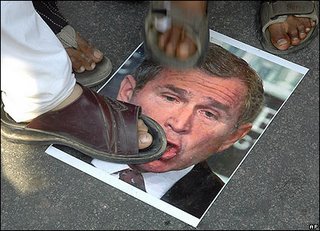
Hola, Sr. Bush
Report: Get ready for post-Castro Cuba
'The U.S. government will need to be prepared well in advance'
From Elise Labott
CNN Washington Bureau
Friday, June 30, 2006; Posted: 11:09 p.m. EDT (03:09 GMT)
WASHINGTON (CNN) -- The U.S. should have assistance in Cuba within weeks of President Fidel Castro's death to support a transitional government and help move the country toward democracy, a government report recommends.
The report was prepared by the Commission for Assistance to a Free Cuba, an interagency group co-chaired by Secretary of State Condoleezza Rice and Commerce Secretary Carlos Gutierrez, a Cuban-American.
President Bush created the commission in 2003 to "help hasten and ease Cuba's democratic transition," according to its Web site.
The report, obtained by CNN in advance of its scheduled release next week, is billed as a strategic plan to promote democracy on the island once Castro is no longer in power.
"The U.S. government will need to be prepared well in advance to help in the event assistance is requested by the Cuban transition government," the report says.
.....................
The Bush administration already has tightened the four-decades-old U.S. embargo of the island, increased Radio Marti news broadcasts into Cuba, curtailed visits home by Cuban-Americans and limited the amount of money Cuban-Americans can send to relatives.
In September, Bush appointed Caleb McCarry, a former Republican staff member of the House International Relations Committee, as Cuba transition coordinator -- or point man on regime change in Cuba. The position was among the commission's earlier recommendations.
.....................
That would include legal experts to help with elections. Training judges and police would be essential, according to the report.
The six months immediately following Castro's death or ouster would be key to determining U.S. success in the mission, the report says.
"This critical 180-day period could mean the difference between a successful transition period and the stumbles and missteps that have slowed other states in their transitions toward democracy," the report says.
It calls for an $80 million "democratic fund" for two years to strengthen civil society, boost opposition to Castro's regime and facilitate the free flow of information. It recommends at least $20 million a year for democracy programs "until the dictatorship ceases to exist."
The report recommends offering a substantial aid package to the transitional government if it met certain criteria under the 1996 Helms-Burton Act.
Those criteria would include freeing all political prisoners, legalizing all political activity, conducting democratic elections and establishing a free press.
........................
Cuba expert Philip Peters of the Lexington Institute, a Virginia-based think tank, said normalization of relations between Cuba and the United States could take time.
.........................
He noted that U.S. influence "will be limited by decades of policies that have blocked communication between our peoples and governments, and by the all-or-nothing posture that the Helms-Burton law imposes on U.S. diplomacy."
So after 46 years of trying to destroy Castro, why should the US expect to be able to place their puppets in charge of Cuba.
Everything you see in Iraq, that what was planned for Cuba.
A lot of people have the delusion that they can go back to Cuba and play a role. I think they're going to be unpleasantly surprised. As will the US, when the Cubans turn to Europe and China for help in rebuilding their country.
No comments:
Post a Comment